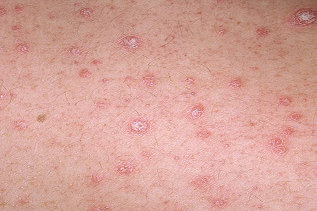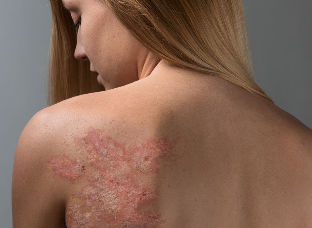
Psoriasis affects about 4% of the world population. It can develop at any age, from birth until old age, but most of all the psoriasis "loves" the young. This is demonstrated by the fact that 70% of patients suffering from psoriasis aged less than 20 years.
The symptoms of psoriasis: itching, rash, desquamation
Who to contact: doctor-dermatologist
Analysis and investigation: a biopsy of the skin
Methods of treatment: cryotherapy, PUVA-therapy, plasmapheresis
Psoriasis, a chronic non-infectious disease, which often manifests itself in the form of rashes and peeling of the skin.
Psoriasis affects about 4% of the world population. It can develop at any age, from birth until old age, but most of all the psoriasis "loves" the young. This is demonstrated by the fact that 70% of the patients, suffering from psoriasis at the age of 20 years.
If the rash has appeared, similar to psoriasis – it is necessary to consult a dermatologist. Skin rashes are an itchy peeling of the plate of various sizes. When platelets in psoriasis can be located on the elbows, knees, scalp, or other parts of the body. The doctor can provide an accurate diagnosis and, depending on its form, to prescribe a treatment.
The causes of psoriasis
Psoriasis is an abnormal reaction of the organism to external stimuli, for which in some areas of the body the upper layer of the skin dies a lot faster than normal. If you usually cycle, division and maturation of cells of the skin occurs for 3-4 weeks, then for the psoriasis, this process happens in just 4-5 days.
Currently psoriasis believe hereditary multifactorialnyh of the disease: the disease is not one but a series of reasons – immunological shifts, metabolic disorders, endocrine and neurological disorders. In this case we can say with certainty: psoriasis is not contagious, so it is not a contagious disease.
The causes of psoriasis are not yet finally found. There are various theories.
According to one theory, there are two types of psoriasis:
• Psoriasis type I is called transferred to successive failures of the immune system. This form of psoriasis affects about 65% of the people, and the disease manifests at a young age, from 18 to 25 years.• Psoriasis type II manifests itself in people over the age of 40 years. With this type of psoriasis is not hereditary and is not associated with faults in the cells of the immune system. Also, unlike psoriasis, type I, prefer to the skin, psoriasis, type II more often affects the nails and joints.
According to another theory, the cause of psoriasis are only the violations of the immune system caused by various factors: it can be stress or infectious diseases, or cold climate, or the wrong food. For example, observed that alcohol can cause a worsening of psoriasis — this applies especially to beer, champagne, strong alcoholic drinks. The use of products containing vinegar, pepper, chocolate, and also worsens the course of disease and can cause a worsening of psoriasis. According to this theory, psoriasis is a systemic disease. This means that in the event of serious irregularities in the functioning of the immune system, the process can spread to other organs and tissues, for example, on the joints. The result can develop psoriatricheskii arthritis, which is characterized by a defeat in the small joints of the hands and feet.
The symptoms of psoriasis

The symptoms of psoriasis are inflamed, flaking patches of red color, accompanied by severe itching. These spots (platelets) are most often found on the scalp, knees, and elbow joints, in the lower part of the back and in the places of the folds of the skin . About a fourth of the patients affected, the nails.
Depending on the seasonality of relapses (worsening of disease), there are three types of psoriasis: winter, summer, indefinitely. More frequent winter type of psoriasis.
In a period of acute manifestations of psoriasis on the hands, on the knees, on the head, and also in the lower part of the back and in the places of the folds of the skin act in the form of plaques of reddish color. They vary in size from pinhead to large areas the size of a palm and more.
Skin rashes are usually accompanied by flaking and painful itching. In the process of peeling of superficial scales are more narrow, are situated in the depth (hence the second name of psoriasis — bow zoster). Sometimes in the context of the affected areas cracks and suppuration.
For progressive psoriasis is characterized by the so-called phenomenon Kebnera: the development of plaques in places of injuries or abrasions of the skin.
About a fourth of the patients affected, the nails. When you experience points and spotting the nail plate. In addition, the nails can utolzhatsya and crumble.
In the summer, under the influence of the solar rays, in patients with winter form of psoriasis symptoms weaken, and sometimes even disappear completely. Bed years a form of psoriasis, on the contrary, it is recommended that you avoid exposure to the sun, because it worsens the course of the disease.
The diagnosis of psoriasis
Diagnostic psoriasis a dermatologist. He must turn to when they appears on the skin rash similar to a psoriatic — plaques of various sizes, red, itchy and peeling. To clarify the diagnosis may require a biopsy of the skin.
The treatment of psoriasis
If the doctor has revealed psoriasis in the initial phase, it is quite possible, you will be assigned mainly to prevention, and not remedy.
In the case of major disease manifestations we apply the following methods of treatment of psoriasis:
• cryotherapy — a method of exposure to cold;• plasmapheresis - blood cleansing;
• ultraviolet light therapy — the treatment is of short duration and procedures similar to visit the solarium. For a greater effectiveness of the treatment of psoriasis this method is often combined with the intake of particular medications PUVA-therapy).
In any case, do not attempt to themselves for the treatment of psoriasis with ultraviolet light without the advice of your doctor. In psoriasis, small doses of ultraviolet radiation are medicinal, but elevated, on the contrary, can podhlestnut the development of the disease. The same is true for the sun baths.
Unfortunately, no one knows how to cure psoriasis completely, since the body "retains the memory" of the disease in the form of biochemical, immunological and functional changes. The relapse of psoriasis can happen at any time, therefore, patients with this diagnosis must be constantly observed by a dermatologist.























